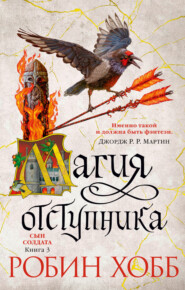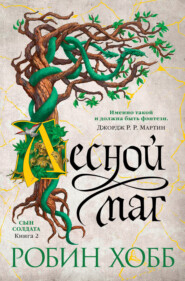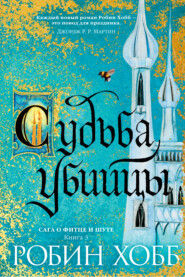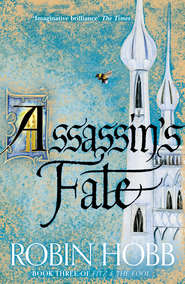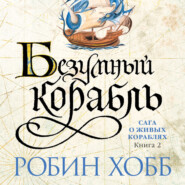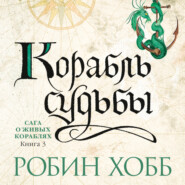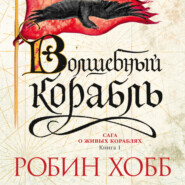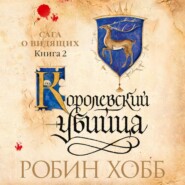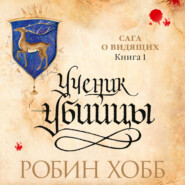По всем вопросам обращайтесь на: info@litportal.ru
(©) 2003-2024.
✖
The Complete Tawny Man Trilogy: Fool’s Errand, The Golden Fool, Fool’s Fate
Автор
Год написания книги
2018
Настройки чтения
Размер шрифта
Высота строк
Поля
‘Ah. Another question answered.’ He drew a snowy kerchief from inside his pocket and ruined it by wiping the red ink from his finger. ‘So. Are you going to tell me all the events in order, or must I pry bits out of you one at a time?’
I sighed. I dreaded recalling those times. Chade had been willing to accept an account of the events that related to the Farseer reign. The Fool would want more than that. Even as I cringed from it, I could not evade the notion that somehow I owed him that telling. ‘I’ll try. But I’m tired, and we’ve had too much brandy, and it’s far too much to tell in one evening.’
He tipped back in my chair. ‘Were you expecting me to leave tomorrow?’
‘I thought you might.’ I watched his face as I added, ‘I didn’t hope it.’
He accepted me at my word. ‘That’s good, then, for you would have hoped in vain. To bed with you, Fitz. I’ll take the boy’s cot. Tomorrow is soon enough to begin to fill in nearly fifteen years of absence.’
The Fool’s apricot brandy was more potent than the Sandsedge, or perhaps I was simply wearier than usual. I staggered to my room, dragged off my shirt and dropped into my bed. I lay there, the room rocking gently around me, and listened to his light footfalls as he moved about in the main room, extinguishing candles and pulling in the latch string. Perhaps only I could have seen the slight unsteadiness in his movements. Then he sat down in my chair and stretched his legs towards the fire. At his feet, the wolf groaned and shifted in his sleep. I touched minds gently with Nighteyes; he was deeply asleep and welling contentment.
I closed my eyes, but the room spun sickeningly. I opened them a crack and stared at the Fool. He sat very still as he stared into the fire, but the dancing light of the flames lent their motion to his features. The angles of his face were hidden and then revealed as the shadows shifted. The gold of his skin and eyes seemed a trick of the firelight, but I knew they were not.
It was hard to realize he was no longer the impish jester who had both served and protected King Shrewd for all those years. His body had not changed, save in colouring. His graceful, long-fingered hands dangled off the arms of the chair. His hair, once as pale and airy as dandelion fluff, was now bound back from his face and confined to a golden queue. He closed his eyes and leaned his head back against the chair. Firelight bronzed his aristocratic profile. His present grand clothes might recall his old winter motley of black and white, but I wagered he would never again wear bells and ribbons and carry a rat-headed sceptre. His lively wit and sharp tongue no longer influenced the course of political events. His life was his own now. I tried to imagine him as a wealthy man, able to travel and live as he pleased. A sudden thought jolted me from my complacency.
‘Fool?’ I called aloud in the darkened rooms.
‘What?’ He did not open his eyes but his ready reply showed he had not yet slipped towards sleep.
‘You are not the Fool any more. What do they call you these days?’
A slow smile curved his lips in profile. ‘What do who call me when?’
He spoke in the baiting tone of the jester he had been. If I tried to sort out that question, he would tumble me in verbal acrobatics until I gave up hoping for an answer. I refused to be drawn into his game. I rephrased my question. ‘I should not call you Fool any more. What do you want me to call you?’
‘Ah, what do I want you to call me now? I see. An entirely different question.’ Mockery made music in his voice.
I drew a breath and made my question as plain as possible. ‘What is your name, your real name?’
‘Ah.’ His manner was suddenly grave. He took a slow breath. ‘My name. As in what my mother called me at my birth?’
‘Yes.’ And then I held my breath. He spoke seldom of his childhood. I suddenly realized the immensity of what I had asked him. It was the old naming magic: if I know how you are truly named, I have power over you. If I tell you my name, I grant you that power. Like all direct questions I had ever asked the Fool, I both dreaded and longed for the answer.
‘And if I tell you, you would call me by that name?’ His inflection told me to weigh my answer.
That gave me pause. His name was his, and not for me to bandy about. But, ‘In private, only. And only if you wished me to,’ I offered solemnly. I considered the words as binding as a vow.
‘Ah.’ He turned to face me. His face lit with delight. ‘Oh, but I would,’ he assured me.
‘Then?’ I asked again. I was suddenly uneasy, certain that somehow he had bested me yet again.
‘The name my mother gave me, I give now to you, to call me by in private.’ He took a breath and turned back to the fire. He closed his eyes again but his grin grew even wider. ‘Beloved. She called me only “Beloved”.’
‘Fool!’ I protested.
He laughed, a deep rich chuckle of pure enjoyment, completely pleased with himself. ‘She did,’ he insisted.
‘Fool, I’m serious.’ The room had begun to revolve slowly around me. If I did not go to sleep soon, I would be sick.
‘And you think I am not?’ He gave a theatrical sigh. ‘Well, if you cannot call me Beloved, then I suppose you should continue to call me Fool. For I am ever the Fool to your Fitz.’
‘Tom Badgerlock.’
‘What?’
‘I am Tom Badgerlock now. It is how I am known.’
He was silent for a time. Then, ‘Not by me,’ he replied decisively. ‘If you insist we must both take different names now, then I shall call you Beloved. And whenever I call you that, you may call me Fool.’ He opened his eyes and rolled his head to look at me. He simpered a lovesick smile, then heaved an exaggerated sigh. ‘Good night, Beloved. We have been apart far too long.’
I capitulated. Conversation was hopeless when he got into these moods. ‘Goodnight, Fool.’ I rolled over in my bed and closed my eyes. If he made any response, I was asleep before he uttered it.
SIX The Quiet Years (#ulink_5c7c9e59-c463-590d-bef8-754c89fcac16)
I was born a bastard. The first six years of my life, I spent in the Mountain Kingdom with my mother. I have no clear recollections of that time. At six, my grandfather took me to the fort at Moonseye, and there turned me over to my paternal uncle, Verity Farseer. The revelation of my existence was the personal and political failure that led my father to renounce his claim to the Farseer throne and retire completely from court life. My care was initially given over to Burrich, the Stablemaster at Buckkeep. Later, King Shrewd saw fit to claim my loyalty, and apprentice me to his court assassin. With the death of Shrewd, by the treachery of his youngest son Regal, my loyalty passed to King Verity. Him I followed and served until the time I witnessed him pour his life and essence into a dragon of carved stone. Thus was Verity-as-Dragon animated, and thus were the Six Duchies saved from the depredations of the Red Ship Raiders of the Out Islands, for Verity-as-Dragon led the ancient Elderling dragons as they cleansed the Six Duchies of the invaders. Following that service to my king, injured in both body and spirit, I withdrew from court and society for fifteen years. I believed I would never return.
In those years, I attempted to write a history of the Six Duchies, and an accounting of my own life. In that time, I also obtained and studied various scrolls and writings on a wide variety of topics. The disparity of these pursuits was actually a concerted effort on my part to track down the truth. I strove to find and examine the pieces and forces that had determined why my life had gone as it had. Yet the more I studied and the more I entrusted my thoughts to paper, the more truth eluded me. What life showed me, in my years apart from the world, was that no man ever gets to know the whole of a truth. All I had once believed of all my experiences and myself, time alone illuminated anew. What had seemed clearly lit plunged into shadow, and details I had considered trivial leapt into prominence.
Burrich the Stablemaster, the man who raised me, once warned me ‘When you cut pieces from the truth to avoid sounding like a fool, you end up sounding like a moron instead.’ I have discovered that to be true, from first hand experience. Yet even without deliberately attempting to cut and discard pieces of a story, years after giving a full and just accounting of an event, a man may discover himself a liar. Such lies happen not by intent, but purely by virtue of the facts he was not privy to at the time he wrote, or by being ignorant of the significance of trivial events. No one is pleased to discover himself in such a strait, but any man who claims never to have experienced it is but stacking one lie on top of another.
My efforts at writing a history of the Six Duchies were based on oral accounts and the old scrolls that I had had access to. Even as I set pen to paper, I knew I might be perpetuating another man’s error. I had not realized that my efforts to recount my own life might be subject to the same flaw. The truth, I discovered, is a tree that grows as a man gains access to experience. A child sees the acorn of his daily life, but a man looks back on the oak.
No man can return to being a boy. But there are interludes in a man’s life when, for a time, he can recapture the feeling that the world is a forgiving place and that he is immortal. I have always believed that was the essence of boyhood: believing that mistakes could not be fatal. The Fool brought that old optimism out in me again, and even the wolf seemed puppyish and fey for the days he was with us.
The Fool did not intrude into our lives. I made no adaptations or adjustments. He simply joined us, setting his schedule to ours and making my work his own. He was invariably stirring before I was. I would awake to find the door of my study and my bedroom door open, and like as not the outside door open as well. From my bed, I would see him sitting cross-legged like a tailor on my chair before my desk. He was always washed and dressed to face the day. His elegant clothes disappeared after that first day, replaced with simple jerkins and trousers, or the evening comfort of a robe. The moment I was awake, he was aware of my presence, and would lift his eyes to mine before I spoke. He was always reading, either the scrolls and documents that I had painstakingly acquired, or those composed by me. Some of those scrolls were my failed attempts at a history of the Six Duchies. Others were my disjointed efforts to make sense of my own life by setting it onto paper. He would lift an eyebrow to my wakefulness, and then carefully restore the scroll to precisely where it had been. Had he chosen to do so, he could have left me ignorant of his perusal of my journals. Instead, he showed his respect by never questioning me about what he had read. The private thoughts that I had committed to paper remained private, my secrets sealed behind the Fool’s lips.
He dropped effortlessly into my life, filling a place that I had not perceived was vacant. While he stayed with me, I almost forgot to miss Hap, save that I hungered so to show the boy off to him. I know I spoke often of him. Sometimes the Fool worked alongside me in the garden or as I repaired the stone and log paddock. When it was a task for one man, such as digging the new postholes, he perched nearby and watched. Our talk at such times was simple, relating to the task at hand, or the easy banter of men who have shared a boyhood. If ever I tried to turn our talk to serious matters, he deflected my questions with his drollery. We took turns on Malta, for the Fool bragged she could jump anything, and a series of makeshift barriers across my lane soon proved this was so. The spirited little horse seemed to enjoy it as much as we did.
After our evening meal, we sometimes walked the cliffs, or clambered down to stroll the beaches as the tide retreated. In the changing of the light, we hunted rabbits with the wolf, and came home to set a hearth-fire more for cheer than warmth. The Fool had brought more than one bottle of the apricot brandy, and his voice was as fine as ever. Evenings were his turn to sing, and talk, and tell stories, both amazing and amusing. Some seemed to be drawn from his own adventures; others were obviously folklore acquired along the way. His graceful hands were more articulate than the puppets he once had fashioned, and his mobile face could portray every character in the tales he told.
It was only in the late evening hours, when the fire had burned to coals and his face was more shadow than shape that he led my talk where he would go. That first evening, in a quiet voice mellowed by brandy, he observed, ‘Have you any idea how hard it was for me to let Girl on a Dragon carry me off and leave you behind? I had to believe that the wheels were in motion, and you would live. It taxed my faith in myself to the utmost to fly off and leave you there.’
‘Your faith in yourself?’ I demanded, feigning insult. ‘Had you no faith in me?’
The Fool had spread Hap’s bedding on the floor before the hearth, and we had abandoned our chairs to sprawl in the dubious comfort there. The wolf, his nose on his paws, dozed on my left side while on my right, the Fool leaned on his elbows, chin propped in his hands. He gazed into the fire, his lifted feet waving vaguely.
The last flames of the fire danced merrily in his eyes. ‘In you? Well. I shall say only that I took great comfort in the wolf at your side.’
In that, his confidence was not misplaced, the wolf observed wryly.
I thought you were asleep.
I’m trying to be.
The Fool’s voice was almost dreamy as he went on, ‘You had survived every cataclysmic event that I had ever glimpsed for you. So I left you, forcing myself to believe that there was a period of quiet in store for you. Perhaps, even, a time of peace.’
‘There was. After a fashion.’ I took a breath. I nearly told him of my death watch by Will. Almost, I told him of how I had reached through Will with the Skill-magic, finally to seize control of Regal’s mind and work my will on him. I let the breath out. He didn’t need to hear that; I didn’t need to relive it. ‘I found peace. A bit at a time. In pieces.’ I grinned foolishly to myself. Odd, the small things that are amusing when one has had enough to drink.
I found myself speaking of my year in the Mountains. I told him how we had returned to the valley where the hot springs flowed, and of the simple hut I had built against the coming of winter. The seasons turn more quickly in the high country. One morning the leaves of birch trees are veined in yellow, and the alder has gone red in the night. A few more nights, and they are bare-fingered branches reaching towards a cold blue sky. The evergreens hunch themselves against the oncoming winter. Then the snow comes, to cloak the world in forgiving white.






